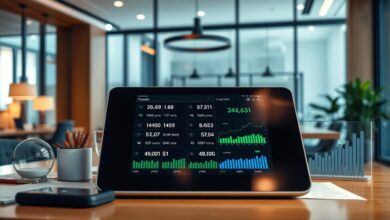Understanding Mobile Banking: Benefits and Features for Nigerians
Mobile banking has changed how we bank in Nigeria, making it easier and more convenient. You can use your smartphone to manage your money, send money, and check your account. This way, you don’t need to go to a bank.
More people are using mobile banking apps, SMS, and USSD codes. This shows they work well for Nigerians.
Mobile banking helps more people get bank accounts. It’s especially good for those who couldn’t use traditional banks before. Also, it’s cheaper than going to a bank, which is great for many Nigerians. But, some areas don’t have good network, making mobile banking hard to use there.
Keeping your money safe is very important in mobile banking. Banks use special security like biometric and encryption to protect your info. But, sometimes, there are limits on how much you can do to stop fraud.
Even so, mobile banking is getting better and more people can use it. Banks like ALAT by WEMA Bank, GTBank, and Zenith Bank are making it easier for everyone. This could lead to a future where more people have access to financial services in Nigeria.
What is Mobile Banking?
Mobile banking is a new way to manage money using mobile devices. It lets people do banking tasks anywhere, anytime. This breaks the old rules of traditional banking.
Definition of Mobile Banking
Mobile banking uses mobile devices for financial services. It lets users check balances, send money, and pay bills easily. As technology grows, so does mobile banking, making it simple to bank on your phone.
How Mobile Banking Works
Mobile banking works through apps, USSD codes, or SMS. These secure ways keep your banking private and safe. It’s especially helpful in places like Nigeria where old banking systems are limited.
The Growth of Mobile Banking in Nigeria
Mobile banking has changed Nigeria’s financial scene a lot. More people are using mobile banking, thanks to several reasons. These reasons help us understand why mobile banking is growing so fast.
Factors Driving Adoption
Several things help more people use mobile banking in Nigeria. Key factors include:
- Smartphone penetration: Even though only about 44 percent of Nigerians had smartphones in 2022, this number is growing.
- Affordable mobile data: Cheaper internet makes people more likely to use mobile banking.
- Policy changes: The Central Bank of Nigeria’s new rules on withdrawals and naira redesign have made digital banking more appealing.
- Need for financial inclusion: Many Nigerians want easy and quick banking options because of accessibility issues.
Statistics on Mobile Banking Usage
Mobile banking use has seen a big jump. In January 2023, mobile banking use went up by 230.72 percent from the year before. This was a big moment for the financial world. Here are some numbers that show this growth:
- Mobile gateways saw 108.14 million transactions, a huge jump from the year before.
- Transaction value went up by 124.85 percent, reaching N2.37 trillion from January 2022 to January 2023.
- Success rates for transactions via mobile apps are about 80 percent, showing users trust these platforms.
- Broadband access in Nigeria was 47.36 percent as of December 2022, helping mobile banking services get better.
Key Benefits of Mobile Banking for Nigerians
Mobile banking has changed the way people manage money in Nigeria. It offers many benefits that make banking easier and more convenient. Now, people can handle their money from anywhere, anytime.
Convenience and Accessibility
Mobile banking is super convenient. You can check your account, send money, and pay bills anytime, anywhere. This is great for those living far from banks.
It saves time and makes banking easy for everyone. No need to travel to a bank branch.
Cost-Effectiveness
Mobile banking is also cheaper than traditional banking. It has lower fees and makes transferring money easier. This means you can save money on everyday transactions.
Many apps make paying bills and sending money simple. It’s a cost-effective way to manage your finances.
Security Features
Security is a big deal in mobile banking. Apps use advanced security like biometric authentication and encryption. This keeps your money safe from fraud.
Many banks also let you watch your account for suspicious activity. You can even freeze your cards if they’re lost or stolen. This makes mobile banking safe and trustworthy.
Common Features of Mobile Banking Applications
Mobile banking apps have many features to make banking easier and more convenient. They focus on three main areas: managing accounts, transferring funds, and paying bills.
Account Management
Mobile banking lets users easily keep track of their money. They can see their account balances, check past transactions, and get updates on their spending. Plus, features like biometric authentication add an extra layer of security, making it safer to manage your money on the go.
Fund Transfers
Transferring money is a key feature of mobile banking. Users can send money quickly and safely, both within their country and abroad. This digital method is faster and more secure than using cash, making it a popular choice for managing money.
Bill Payments
Mobile banking apps also make paying bills easy. Users can pay for things like utilities and internet subscriptions right from their phones. This makes paying bills simpler and reduces the need to visit a bank in person. With features like mobile check deposits, accessing your money is faster than ever.
The Impact of Mobile Banking on Financial Inclusion
Mobile banking is key in making financial services available to more people in Nigeria. It helps those who don’t have bank accounts. Now, they can manage their money using their phones, without needing a bank branch.
Reaching the Unbanked Population
Mobile banking opens doors to financial services for many who were left out before. In Nigeria, a lot of people don’t have bank accounts. But with mobile banking, they can save, get loans, and make transactions on their phones.
This lets them join the formal economy. It’s a big step forward for financial inclusion.
Facilitating Microtransactions
Small transactions are important for people to take part in the economy. Mobile banking makes it easy to do these small deals. Users can pay bills, send money, or buy things online.
This helps people handle their money better. It’s a big help in making sure everyone in Nigeria has access to financial services.
Challenges Facing Mobile Banking Adoption
Mobile banking in Nigeria has many hurdles to overcome. These obstacles can slow down its growth and adoption. To improve user experience and gain more acceptance, these challenges need to be tackled.
Internet Connectivity Issues
Internet access is a big problem for mobile banking in Nigeria. Many areas lack reliable mobile networks. This makes it hard for people to use mobile banking services.
The unreliable internet not only limits what users can do. It also causes frustration and lowers trust in mobile banking.
Security Concerns
Security is another major challenge for mobile banking. People in Nigeria worry about fraud and data breaches when doing online banking. Banks try to protect users’ data, but more needs to be done.
It’s important for users to practice safe online banking habits. Building trust and confidence in mobile banking is key to overcoming these security concerns.
Tips for Safe Mobile Banking
Using mobile banking safely is key for anyone with financial apps on their devices. Keeping personal info safe and stopping unauthorized access is crucial. It’s important to know how to protect your data while using mobile banking.
Protecting Personal Information
Here are some ways to keep your personal info safe:
- Use strong, unique passwords for each banking app. Try longer passphrases with numbers, special characters, and both uppercase and lowercase letters.
- Enable two-factor authentication (2FA) when available. This adds an extra security layer by needing more than one ID.
- Log out after finishing banking sessions. This helps prevent data sharing and unauthorized access.
- Regularly update device software and mobile banking apps to avoid security risks.
- Report lost or stolen devices to both the bank and the wireless provider right away to reduce risks.
- Avoid using public Wi-Fi for financial apps, as it’s less secure.
Recognizing Phishing Scams
Being careful about phishing scams is vital for safe mobile banking. These scams often come as emails or messages asking for sensitive info. Here’s how to fight them:
- Be wary of unsolicited messages asking for personal info.
- Check the source of any message before clicking links or sharing info.
- Watch for phishing signs like odd sender addresses or spelling mistakes.
- Report suspected phishing scams to your bank to protect others.
Future Trends in Mobile Banking
The mobile banking scene in Nigeria is changing fast. New trends are coming, thanks to tech advancements. Banks are making their services better for users and more efficient.
Innovations in Technology
Mobile banking’s future looks bright with new tech. Artificial intelligence (AI) and machine learning (ML) are making banking more personal. They help banks meet customer needs quickly, improving service.
Mobile-only banks like Revolut are leading the way. They offer free international transfers, showing how banking can be easier and more user-friendly.
- Incorporation of voice-activated banking services, like those offered by Ally Bank via Amazon Alexa.
- Integration of Banking-as-a-Service (BaaS) and open banking APIs for seamless service connectivity.
- Enhanced security measures through exploration of blockchain technology, promoting transparency and efficiency.
The Role of Digital Currencies
Digital currencies are changing the financial world. Central Bank Digital Currency (CBDC) projects aim to make payments smoother. This will make mobile banking in Nigeria even better.
A survey shows 89% of people already use mobile banking. Millennials are leading the charge, with 97% using it. Digital currencies will make transactions faster and safer. Banks and fintech companies working together will bring more convenience and access to users.
Conclusion: The Future of Banking in Nigeria
Mobile banking has become key for Nigerians, changing how we deal with money. It offers ease, saves money, and keeps our info safe. Now, about 55% of Nigerians use mobile banking, showing a big change in Nigeria’s banking world.
Most banks, 80%, use new tech to make banking better for everyone. This shows how mobile banking is changing the game.
Summary of Benefits
Mobile banking brings more than just ease. It’s expected to grow, with over 67% of users looking forward to new features. It’s not just a trend; it’s a big change for Nigeria’s finance scene.
Studies also show it could help fight poverty. It connects people who need financial help to the resources they need.
The Road Ahead for Mobile Banking
The future of mobile banking in Nigeria looks good, but there are hurdles. Security and legal issues need to be fixed. Banks must hire the right people and use the latest tech to stop scams.
As banking gets better, digital money and new tech will make mobile banking even more useful. It will help everyone get involved in the economy and grow financially.
FAQ
What is mobile banking?
How does mobile banking work?
What are the benefits of mobile banking for Nigerians?
How has mobile banking grown in Nigeria?
What features do mobile banking applications typically offer?
How does mobile banking impact financial inclusion in Nigeria?
What challenges does mobile banking face in Nigeria?
How can users practice safe mobile banking?
What future trends are expected in mobile banking?
Published on: 21 de November de 2024

Abiade Martin
Abiade Martin, author of WallStreetBusiness.blog, is a mathematics graduate with a specialization in financial markets. Known for his love of pets and his passion for sharing knowledge, Abiade created the site to provide valuable insights into the complexities of the financial world. His approachable style and dedication to helping others make informed financial decisions make his work accessible to all, whether they're new to finance or seasoned investors.






